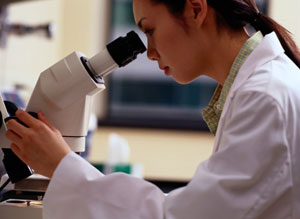Medical Laboratory Scientist
Tasks & duties

Medical laboratory scientists may do some or all of the following:
-
test and study blood, tissue and fluid samples from patients
-
prepare samples for examination by a pathologist
-
evaluate test results and communicate results to hospitals and doctors
-
use and maintain specialised laboratory equipment
-
maintain laboratory quality assurance and safety standards
-
supervise and teach other staff such as medical laboratory technicians
-
test and set up medical equipment such as blood glucose meters for diabetics
-
develop and use new methods and equipment for laboratory testing
Specialisations
Medical laboratory scientists usually specialise in two or more of the following disciplines:
Clinical Biochemist
Clinical biochemists analyse samples of blood, urine, faeces and tissue for diseases such as diabetes and renal failure.
Clinical Immunologist
Clinical immunologists study the body's immune system to test for diseases such as allergies and HIV infection.
Cytogeneticist
Cytogeneticists investigate genetic disease and how chromosomes are affected by disease.
Haematologist
Haematologists analyse blood samples for diseases such as anaemia and cancer.
Histologist
Histologists prepare tissue samples for investigation by a pathologist.
Medical Cytologist
Medical cytologists test cell samples for cancer.
Medical Microbiologist
Medical microbiologists detect, cultivate and test bacteria and fungi.
Transfusion Scientist
Transfusion scientists prepare blood and blood products for transfusion.
Skills & knowledge

Medical laboratory scientists need to have:
-
a good knowledge of chemistry, biology, physiology and maths
-
a broad understanding of pathology and the areas medical laboratory scientists can specialise in
-
in-depth knowledge of their specialisation; for example, histologists need an understanding of body tissues
-
practical skills for operating specialised machines and scientific equipment
-
an understanding of laboratory safety procedures and the ability to follow them
-
good communication skills
Entry requirements
To become a medical laboratory scientist, you need a Bachelor of Medical Laboratory Science.
Secondary education
A tertiary entrance qualification is needed to enter tertiary training and useful subjects include English, biology, chemistry, and maths. Good computer skills are also helpful.
Tertiary education
Three universities in New Zealand offer a Bachelor of Medical Laboratory Science degree: Massey University, the University of Otago and Auckland University of Technology.
Training on the job
Medical laboratory scientists need to take part in specialised courses, and attend conferences and seminars to maintain their annual practising certificates. Their attendance at these courses is compulsory, and is monitored by the NZ Institute of Medical Laboratory Science and the NZ Medical Laboratory Science Board.
Registration
Medical laboratory scientists must be registered with the NZ Medical Laboratory Science Board to practise. To register, you must have a Bachelor of Medical Laboratory Science, or a qualification approved by the NZ Medical Laboratory Science Board, and six months of work experience in a medical laboratory. Once registered, medical laboratory scientists need to maintain an annual practising certificate with the board.
Useful experience
Useful experience for medical laboratory scientists includes visiting or working in a medical laboratory, or any scientific or health work.
Video
From just a job on you tube
Related courses
Epidemiology
Laboratory Technology
For more information, please refer to Career Services.
Document Actions
